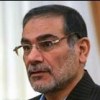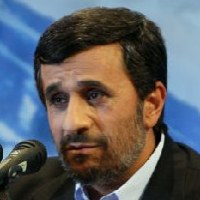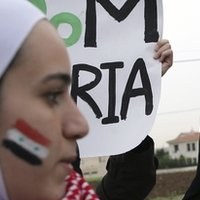![]()
Wed, April 13, 2011 | 09BAGHDAD553
WikiLeaks: U.S. Government Outlines ‘Dilemma’ in Event of Iraqi Crackdown on Iranian Dissidents
Summary:
The Mujahedin e-Khalq (MEK) faces a difficult position in Iraq as the GOI has made clear it considers the group a terrorist organization and seeks the closure of the Camp Ashraf facility and the departure of all the residents from Iraq. It plans to prosecute some members of the group for crimes it believes the MEK conducted on behalf of Saddam Hussein’s regime against both Shi’a and Kurds. The GOI is pressing other countries to take the rest of the residents. Camp Ashraf is now under the security responsibility of the GOI, with a small U.S. force in a monitoring role. The GOI has provided written assurances of humane treatment for the residents of Camp Ashraf and has said it will not forcibly deport any member to a country where he or she might face persecution. While the GOI is impatient on this issue and faces considerable pressure from Iran, it is learning that there is no easy or quick solution.
In order to break-up the cult-like nature of the organization, the GOI is threatening to separate the leaders of the organization from the rank and file. Unless done over time and according to careful preparation and planning, this act (or the decision to seek to arrest the leaders) will cause a humanitarian crisis. If the GOI acts harshly against the MEK and provokes a reaction (or the MEK provokes the Iraqi Security Forces (ISF)), the USG faces a challenging dilemma: we either protect members of a Foreign Terrorist Organization (FTO) against actions of the ISF and risk violating the U.S.-Iraq Security Agreement, or we decline to protect the MEK in the face of a humanitarian crisis, thus leading to international condemnation of both the USG and the GOI. In consultation with the Commanding General (CG), Multi-National Force-Iraq (MNF-I), our selected course of action is to encourage the GOI to negotiate directly with the MEK, press both sides to exercise restraint, monitor the situation at Camp Ashraf, and further involve international organizations and third country diplomats.
End Summary.
Source: WikiLeaks
195061
S E C R E T SECTION 01 OF 04 BAGHDAD 000553
NOFORN SIPDIS
E.O. 12958: DECL: 02/27/2019 TAGS: PTER, PHUM, PINR, PREF, PREL, IZ, IR, US SUBJECT: MEK/CAMP ASHRAF – THE WAY AHEAD
REF: A. BAGHDAD 442 B. BAGHDAD 420 C. BAGHDAD 405 D. BAGHDAD 287 E. BRUSSELS 101 F. BAGHDAD 113 G. 08 BAGHDAD 2658
Classified By: Political Military Minister Counselor Michael H. Corbin for reasons 1.4 (b) and (d)
1. (S/NF) Summary: The Mujahedin e-Khalq (MEK) faces a difficult position in Iraq as the GOI has made clear it considers the group a terrorist organization and seeks the closure of the Camp Ashraf facility and the departure of all the residents from Iraq. It plans to prosecute some members of the group for crimes it believes the MEK conducted on behalf of Saddam Hussein’s regime against both Shi’a and Kurds. The GOI is pressing other countries to take the rest of the residents. Camp Ashraf is now under the security responsibility of the GOI, with a small U.S. force in a monitoring role. The GOI has provided written assurances of humane treatment for the residents of Camp Ashraf and has said it will not forcibly deport any member to a country where he or she might face persecution. While the GOI is impatient on this issue and faces considerable pressure from Iran, it is learning that there is no easy or quick solution.
In order to break-up the cult-like nature of the organization, the GOI is threatening to separate the leaders of the organization from the rank and file. Unless done over time and according to careful preparation and planning, this act (or the decision to seek to arrest the leaders) will cause a humanitarian crisis. If the GOI acts harshly against the MEK and provokes a reaction (or the MEK provokes the Iraqi Security Forces (ISF)), the USG faces a challenging dilemma: we either protect members of a Foreign Terrorist Organization (FTO) against actions of the ISF and risk violating the U.S.-Iraq Security Agreement, or we decline to protect the MEK in the face of a humanitarian crisis, thus leading to international condemnation of both the USG and the GOI. In consultation with the Commanding General (CG), Multi-National Force-Iraq (MNF-I), our selected course of action is to encourage the GOI to negotiate directly with the MEK, press both sides to exercise restraint, monitor the situation at Camp Ashraf, and further involve international organizations and third country diplomats. End Summary.
———- Background ———-
2. (S/NF) There are currently 3400 individuals, most of them members of the MEK, residing at Camp Ashraf, approximately 90 km Northeast of Baghdad. After being expelled from France, the organization relocated to Iraq in 1986, at the invitation of Saddam Hussein. They established the National Liberation Army (NLA), an approximately 7,000-member force (some estimates suggest it may have been as much as three times larger) who pursued conventional combat against the Iranian regime, sometimes unilaterally, other times in concert with the Iraqi forces, utilizing Iraqi territory as their base. From 1986 until the signing of the Iran-Iraq ceasefire in 1988, the NLA suffered significant casualties, particularly in their last offensive. From that time until 2001, the NLA continued periodic small-scale cross border raids and have defended themselves against corresponding Iranian attacks in Iraqi territory. There are conflicting reports of MEK QIraqi territory. There are conflicting reports of MEK operations conducted against Kurdish factions in the North and Shi’a in the South in the aftermath of Operation DESERT STORM.
3. (SBU) During the invasion of Iraq by Coalition Forces (CF) in Operation Iraqi Freedom, MEK bases in Iraq were bombed. Several MEK members were killed or wounded during the attacks, but the MEK members were ordered not to return fire, and they did not. The MEK/NLA subsequently signed a cease fire letter on April 15, 2003. Heavy weapons and all light arms were confiscated from the MEK, and the membership of the MEK in Iraq was consolidated from several MEK camps to the main camp at Ashraf. Joint Task Force-134 (TF-134) began to provide security protection for Camp Ashraf and its residents upon the construction of the adjoining Forward Operating Base (FOB) Grizzly.
BAGHDAD 00000553 002 OF 004
4. (S/NF) Because of reports that the MEK had participated in putting down the Kurdish and Shi’a uprisings and have had relations with terrorist organizations, they do not enjoy a large following in Iraq. Likewise, because they had fought alongside Iraqi forces against Iranians, their popular support in Iran is low. They have, however, succeeded (sometimes with monetary incentives) in endearing themselves to the surrounding villages in Diyala Province, providing jobs, water, medical services, and other support.
5. (S/NF) Although the GOI had several times since 2003 called for the expulsion of the Camp Ashraf residents (CAR), the situation came to a head in June 2008. After a large-scale anti-Iranian (and some say anti-Iraqi) political rally was held at Camp Ashraf, the GOI struck back. The Council of Ministers issued a decree that labeled the MEK as an FTO and made it illegal for anyone to do business with the camp. It officially called for expulsion of the group from Iraq.
6. (S/NF) Anticipating the expiration of the UN mandate allowing unilateral action by CF in Iraq, and that protected persons status could no longer be offered to the CAR after December 31, 2008, the USG (Embassy/MNF-I) began preparing for and coordinating with the GOI for the transfer of security responsibility for the camp and its residents. The Embassy asked for and received written assurances of humane treatment for the residents (REF G). In summary, the assurances provide that the residents will be treated humanely in accordance with Iraq’s Constitution, laws and international obligations. They also provide that the Government will not transfer residents to any where they may have reason to fear persecution for their political opinions or religious beliefs or where they may be subject to torture.
7. (S/NF) The GOI has presented its official position on the MEK: they are a terrorist organization, but the members will be treated as individuals. They have been given only two options: repatriate willingly to Iran or to a third country of their choosing.
———– The New Era ———–
8. (S) As of January 1, 2009, the USG no longer accords CAR protected persons status under the Fourth Geneva Convention – a policy position reached by OSD in 2004. Currently, however, 200 U.S. soldiers remain posted near Camp Ashraf (at FOB Grizzly) to monitor and report on the situation at the camp. These forces operate at the invitation of the GOI in accordance with the Security Agreement.
9. (S/NF) On January 1, the USG began a coordinated process of turning security of the camp fully over to the GOI. This process, which included training of the Iraqi Army (IA) battalion (BN) stationed at Camp Ashraf and joint manning of the checkpoints leading into the camp, was completed on February 20.
—————————– GOI Plans with Regard to Camp —————————–
10. (S) An inter-ministerial committee was established by the GOI under the direction of National Security Advisor (NSA) Dr. Mowaffaq al-Rubaie. This committee is studying various options for the CAR (REF B), including:
— Arresting leaders. We know there are currently three active GOI arrest warrants for MEK leaders. There are Qactive GOI arrest warrants for MEK leaders. There are reports of up to 54 MEK members wanted by the Iranian Government (it is unclear how many of these 54 are actually at Camp Ashraf).
— Separating leaders from the rank and file. Rubaie noted that one option being considered was to physically separate the “top 50-100” leaders from the rest of the camp, either within the camp or otherwise.
— Relocating residents to diverse locations far from Iran. Rubaie is studying a proposal to relocate CAR to “two or three” other locations in the Western part of Iraq, “away from the possibility of Iranian attack.”
BAGHDAD 00000553 003 OF 004
11. (S/NF) While the third option is least likely, execution of any of the three is likely to cause a humanitarian crisis. A recent defector revealed plans for limited to large-scale immolations, at Camp Ashraf and abroad, and acts of suicide by at least female leaders should GOI enter the camp to arrest leaders. There are also plans for large demonstrations by CAR to protest any extended GOI presence in the camp. These demonstrations, while intended to be peaceful, could easily grow into a violent confrontation with ISF (REF F). MNF-I rules of engagement (ROE) permit forces to respond to situations in which deadly force is used against unarmed persons.
————————– International Resettlement ————————–
12. (S/NF) More than 1000 of the CAR allege ties to third countries other than Iran. France, Germany, Canada, Australia and the UK make up a majority of the claims. The EU recently de-listed the MEK as an FTO (REF E). As such, we have requested that the Department demarche European capitals (REF D) to urge them to repatriate their nationals; to consider, for humanitarian reasons, renewing refugee status claims; and to allow those with family ties to enter their countries for family reunification purposes.
13. (S/NF) The Iranian Embassy in Baghdad has told the Iraqi Minister of Human Rights that it intends to issue valid passports to all 3400 CAR and send them to Turkey (REF C). Contrary to public statements (REF D), the Iranian Ambassador told the Minister that Iran does not want to repatriate any of the MEK defectors to Iran. ICRC officials told us February 5 that they believed Iran would repatriate former MEK members, but noted there have not been any repatriations since April 2008. The ICRC has noted that they have no reports of persecution of the former MEK members who have returned to Iran, but also admits that its capability to monitor in Iran is extremely limited. Without strict international monitoring, it is likely that few of the 3400 CAR would chose to return to Iran.
———————- Way Ahead Here in Iraq ———————-
14. (S) In conjunction with the MNF-I, our plan is to press the GOI to honor its humanitarian assurances (most recently reaffirmed by PM Maliki on Feb 19 (REF A)). PM Maliki responded he would scrupulously respect the assurances. TF-134 will monitor the camp and continue to facilitate coordination between the CAR and the GOI.
15. (S) The 200 U.S. soldiers at FOB Grizzly will continue to observe and record GOI conduct toward the MEK, as will an Embassy team and international organizations, such as ICRC and UNAMI. The CDA and CG MNF-I will personally protest any violations of humanitarian assurances directly to PM Maliki. Our military forces will not interfere with GOI efforts to arrest leaders, but will seek to prevent mistreatment of civilians, in accordance with CENTCOM ROE. Because U.S. military intervention has the potential to precipitate a crisis in our relationship with the GOI, Embassy and MNF-I will coordinate with the highest levels of the GOI in an effort to prevent such a crisis from developing or escalating. Embassy will also immediately consult with the Department in the event of any confrontation between U.S. and QDepartment in the event of any confrontation between U.S. and Iraqi forces.
16. (S) We will continue to encourage international organizations to remain involved in the MEK situation. The ICRC, admitting to a lack of resources, visited the camp once again February 25. Although the ICRC will not establish a permanent presence at Camp Ashraf, officials say they will continue to monitor the humanitarian situation. The UNHCR has noted its intention to interview the two recent MEK defectors in Baghdad regarding their refugee claims. Representatives of the CAR recently traveled to Baghdad, escorted by IA forces, to meet with UNAMI representatives. It is extremely important for these organizations to assist in finding solutions to the MEK situation.
17. (S/NF) As our role in negotiations between the MEK and
BAGHDAD 00000553 004 OF 004
the GOI has diminished, direct interaction between the GOI and the MEK has increased. Upon our recommendation, MEK leaders have begun to address their concerns directly with GOI authorities rather than to us. Tactical coordination between MEK security forces and the IA BN has produced positive results and has increased the confidence of the MEK on the IA providing security for Camp Ashraf.
18. (S/NF) Since Rubaie’s meeting with Western diplomats January 27 (Ref D), we have engaged the French, British, Canadian, Swedish and Australian Embassies regarding CAR who claim to have ties to their countries. While the French Government has noted its intention not to accept any of the CAR, others are consulting with their governments on the prospect. We will provide support to those embassies that wish to visit their nationals and those who claim former refugee status or to have family ties.
19. (S) We believe this measured and evenhanded approach, coupled with extensive senior leader engagement, will defuse a volatile situation. Nevertheless, we cannot be certain of success. It is impossible to entirely eliminate the possibility that (elements of) the GOI, or the MEK, will instigate a confrontation in spite of our efforts.
BUTENIS



 RSS
RSS












Latest Comments
Hello Mike, Thank you for your positive feedback to the article. I felt there wasn’t too much critical analysis of ...
Thanks for this considered and well constructed article. A follow up article on the manner in which the editorial contro...
THE CLUELESSNESS OF CLAIMING THAT OBAMA'S MIDDLE EAST POLICIES WERE A FAILURE CANNOT BE FURTHER FROM THE TRUTH, WHAT THE...
As long as Obama is the president of the usa do not trust the us government......
Thank you for an good read....